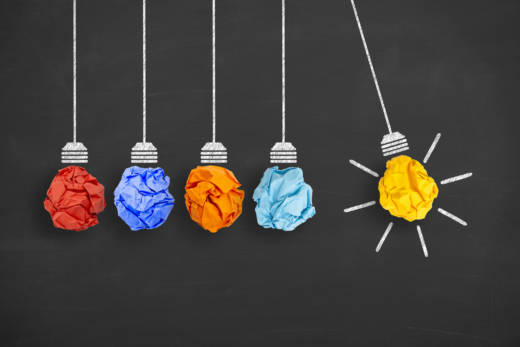She said often what stands in the way of implementing change is the inability to see things beyond what they've always been in the past. In order to figure out if something needs to be unlearned to make room for change, Biller asks four questions:
1. Do I need to think, behave, do or perceive in a new way?
2. Is there previous learning that is getting in the way of my thinking, behaving or perceiving in new ways?
3. Is what I am trying to learn a threat/challenge to my identity, to how I see myself or how I see the world?
4. Would trying harder give me the results I am looking for or might it create more entrenchment?
If something needs to be unlearned, Biller has three frameworks for implementing unlearning: changing mindsets, changing habits and changing organizations.
CHANGING MINDSETS
Changing mindsets has a lot to do with identity, according to Biller. “The way we see ourselves and the way that others see us is threatened when we are asked to do something different,” she said.
When schools implement something like project-based curriculum, administrators are asking experienced teachers to drop what they see as their role in the classroom. They are no longer meant to be the person who keeps all the knowledge.
“A lot of unlearning is how you perceive your identity and role,” Hutton said.
He recalled how one teacher at this school was reluctant to have kids work in small groups. She later admitted that what made her uneasy was that if someone walked into her classroom, they would see that she wasn't standing in the front; she worried that people would then perceive her as not doing anything.
“For her it was a total identity change and that what kids needed from her was a very different kind of skill than what she'd been taught to deliver,” said Hutton.
CHANGING HABITS
Math teacher Jayne Everson said unlearning is really about examining all the assumptions she brings to any space. In her classroom, instead of studying geometry theorems out of a textbook, she lets students develop their own rules by exploring the relationship between lines in famous artwork.
It's been a blast to watch the kids derive the geometry on their own, she said. “We [used to] feel we had to get it perfect the first time and that's not the case.”
Another part of unlearning is reappraising those old habits, said Biller. This is especially difficult for successful teachers. “We've all been successful because we've had routines and processes that really work for us,” Biller said.
When changing habits, “We have to ask ourselves, are those habits that are currently in place helping us reach the goals that we want? And if they're not, how do we change them?” A teacher might only need to slightly change an existing habit, or put in place a whole set of new habits.
Teachers have to think about their own habits in the context of the classroom and what that triggers in terms of behaviors for themselves and students, said Biller.
The system itself has to reset if change is to be successful at a school. In changing systems, administrators need to think about ways in which they provide feedback to teachers and students. It all starts with questions: How do we measure success in a new way that fit with the changes being implemented?
Students in Everson's class, for instance, are not require to complete a final two hour exam on geometry. Instead they work on final projects. One year, that involved making holograms.
“Their proofs were beautiful and elegant,” said Everson. She said students aren't missing out on learning the logic and the skills coming out of a traditional classroom. Instead students see themselves as problem solvers and builders. That's a shift from being a “passive receiver,” said Everson.
And, it doesn't take two-hour exam to “prove” students learned their subject, according to Hutton. “If the kids didn't know the geometry, they couldn't have done the project,” he said.
DEVELOPING TRUST
In getting started with unlearning, “trust” is a big theme. Administrators trust their teachers to guide students to proficiency with core skills. Teachers trust their students to figure it out without hand-holding.
Everson said that you can start developing trust by letting your students have a voice in what they do in the classroom. She also added that trusting your students is the area where you'll unlearn the most. “I've never been disappointed,” she said. “They always exceed my expectations.”
Teachers can also start by asking questions of themselves, something Biller does all the time. If she finds herself resistant to a concept or group, Biller asks “why am I reacting this way?” If Biller meets someone she disagrees with, she doesn't say that person is wrong. Instead, she asks “what is it I can learn from that person?”


